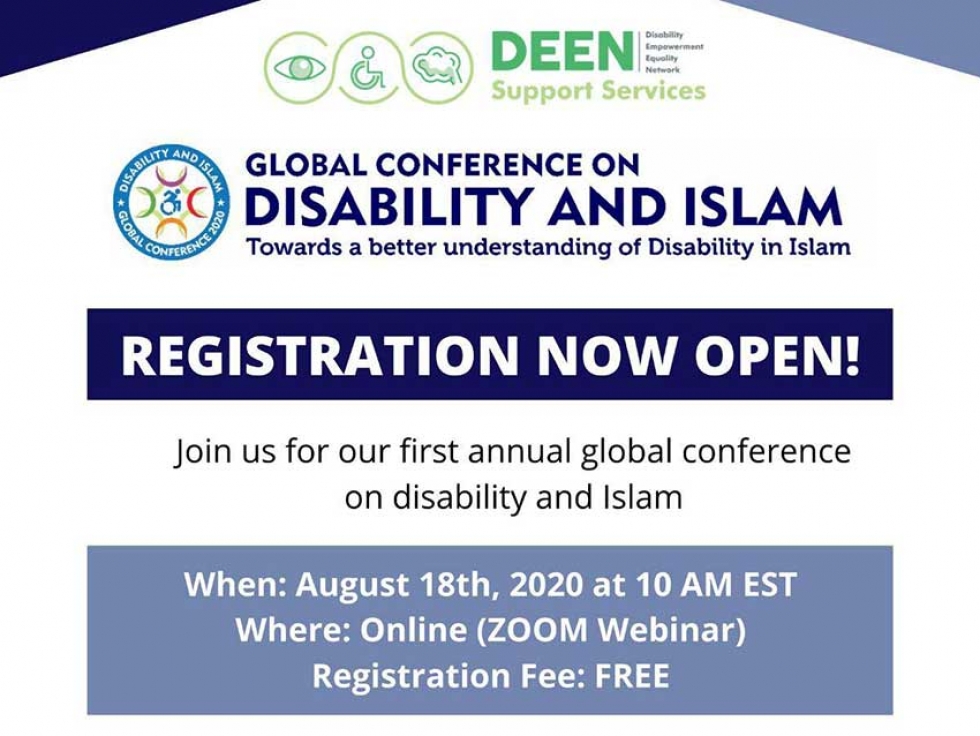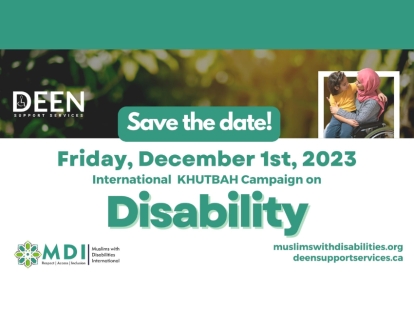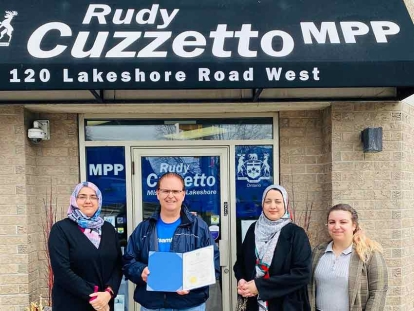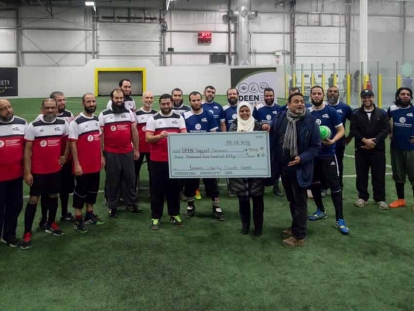
Jul
First Global Conference on Disability and Islam: Interview with Disability Activist Rafia Haniff-Cleofas
Written by Chelby DaigleDEEN Support Services is organizing the first Global Conference on Disability and Islam on August 18, which will be able free online.
Guyanese Canadian Rafia Haniff-Cleofas is one of the conference organizers. She contracted polio as a child in Guyana which left her unable to walk. She now uses a powered wheelchair. She is a certified Human Resources professional who worked as a supervisor for the Outreach Recruitment Program at the City of Toronto. She is active in Canada's disability rights movement over the last 25 years. She is a founding member of ERDCO - The Ethno Racial People with Disabilities Coalition of Ontario which was established in 1993 to advance the social inclusion, rights, and diverse voices of racialized people with disabilities. Rafia is also a founding member of CAM-D the Canadian Association of Muslims with Disabilities. CAM-D strives to make the Muslim community inclusive of those with disabilities. She is also a founding member of the Canadian Alliance on Race and Disability CARD, an organization that promotes the intersectionality of race and disabilities and ensure that the voice of racialized people disability is heard at the National level. Currently, Rafia is the Program Manager with DEEN Support Services- Scarborough. She is married with two children. She loves to travel and is a personal development enthusiast with entrepreneurial aspirations.
1. How did you become interested in the relationship between Islam and Disability?
Since childhood, I always had a burning desire to learn about Islam. When my siblings used to go to madrassa (Islamic School) in the afternoon after school, I stayed home because it was difficult to get there because I could not walk, I had no wheelchair and no transportation to get there. So, I taught myself to read Arabic. As soon as I knew how to spell, I picked up the Quran and start reading from it with the help of cassette tapes. Also, my father was a highly requested Speaker and used to give Islamic talks in the village, and I used to help him with his presentation. I used to write out Quranic ayas (verses), hadiths and notes for his speeches. This gave me great sight into the understanding of Islam.
My quest for knowledge continued when I came to Canada. I went from halaqa to halaqa to ensure that I was always in a class. And when a class ended, I would create a class. I remembered when I was living at West Park Hospital, I brought the class to me. Later I studied with American Open University and took several courses with Al Maghrib Institute. I also taught Islamic studies to youths from my home and later at Islamic Institute of Toronto.
Then I got married and moved to Saudi Arabia. There it was difficult to attend classes because most of schools were not accessible. But that did not deter me, my husband (May Allah bless him) would take me up a flight of 15 stairs for 3 levels in my manual wheelchair. It was very difficult for him. But with his help I was able to attend tafseer classes in Jeddah. Subhan Allah.
A few years later, I found Islamic Online University - which was a Godsend. Alhamdulilah. I was able to do all my studies online. I obtained BA in Islamic Studies and completed my thesis on “Fiqh Rulings for Muslims with Disabilities categorized by Al Qawa'id Al Fiqhiyah”.
The reason I am sharing my journey is not to impress you, but to impress upon you that Muslims with disabilities have the same thirst for knowledge like their non-disabled counterparts. It is imperative that we make Islamic education accessible for them. They also want to learn about their obligations to Allah and gain the rewards. Knowledge brings a great reward.
The one who points the way to something good is like the one who does it. When the knowledgeable person dies, his reward with Allaah does not cease when he dies, rather it continues to increase so long as people benefit from his knowledge. The Prophet (peace and blessings of Allaah be upon him) said: “When a man dies, all his deeds come to an end except for three – an ongoing charity, beneficial knowledge or a righteous son who will pray for him.” (Narrated by Muslim, 1631)
2. How did you become involved with Deen Support Services?
It was a natural progression from the work I did in the Disability community from working with racialized people with disabilities in ERDCO to working with Muslims with Disabilities in CAM-D in an advocacy setting to working with DEEN Support Services, as a Service Provider in a Canadian Charitable organization.
3. How did the idea for the Global Disability and Islam Conference come about?
Since CAM-D started in 2006, my colleague, good friend, and CEO of DEEN Support Services Rabia Khedr, and I have been discussing the need for academic research on Muslims with Disabilities. We wanted to ensure that information about and needs of faith, spirituality, and culture through the lived experience of persons with disabilities is researched and promoted to leaders, service providers, governments, and communities.
During last Ramadan, as part of our virtual service to the Community due to Covid-19, DEEN Support Services did a series of Webinars on Disability and Islam. It was well received by the community. It was then we realize that the idea of putting on a conference on disability in Islam was feasible. And we started planning. Alhamdulilah, the response has been overwhelming.
4. There was a call out for submissions for the conference. Why was it important to do a call out and not just appoint speakers for the conference.
We wanted to give equal opportunities to service providers, individuals with lived experience of disability, academics, disability advocates, caregivers, Islamic students, and scholars across the globe to explore opportunities and challenges for Muslims with disabilities. The theme of this conference is ‘towards understanding disability in Islam’ and it is important to include all stakeholders’ perspective on this topic.
5. What issues will be explored at the conference?
Marriage, Disability, and Islam, Mental health – Depression in Children and Adolescents, Disability, Islam, Disaster Management, & Environmental and Social Justice, Inclusion of Muslims With Disabilities in Muslim Spaces, Disability Awareness, Jurisprudence and Disability, DEEN Accessibility Audit, Muhsen Masjid Certification, Fictional Representations in Spreading Disability Awareness, Islam, Philanthropy, and Disability, Charity/Begging/Disability, Parenting and Disability, Inclusive Education, Disability and Islamic Spiritual Practice, Qur’an Memorization Program and Disability, Discovering the Beauty of, Islam through Sign Language, and the Experiences of Deaf and Hard of Hearing Muslims.
6. Which countries will be represented by speakers at the conference?
Sweden, Nigeria, Uganda, USA, Canada, South Africa, Pakistan, and Bangladesh
7. Why should Muslims living with disability attend the conference?
We need Muslims with disabilities to actively engage and participate in this dialogue. So, they can discover Information and resources, best practices, support and build on each other success, this will help us achieve full inclusion in our ummah.
8. Why should Muslims who do not live with disability attend the conference?
So they can get a better understanding of the issues and challenges faced by Muslims with disabilities in the community and can address these issues to ensure full inclusion for all.
9. Should people who are not Muslim but who work with Muslims living with disability attend the conference?
Yes definitely. It offers an opportunity to foster changes in attitudes towards Muslims with disabilities and eliminate barriers to their full participation in all aspects of life.
10. What do you hope to be the Conference Outcomes?
The Conference is guided by the principles of “Nothing about us without us” which means the active involvement and participation of persons with disabilities in the planning, and execution of the conference for people with disabilities. This promotes the advancement of truly inclusive societies.
DEEN Support Services will be launching the “Count Us In: Mapping the Needs of Muslims with Disabilities” Research Project funded by Olive Tree Foundation. The “Count Us In” research project will help develop a demographic profile of Muslims with disabilities in Ontario in order to raise awareness about, plan for, and implement appropriate services not only in the Muslim community, but also in the mainstream.
DEEN Support Services will also be sharing our Accessibility Audit to help mosques and Islamic centres meet their obligation under the Accessibility for Ontarians with Disabilities Act (AODA).
We will establish the first issue of DEEN’s annual Journal on Disability and Islam. All submitted papers will be considered for publication.
Another important outcome from the Conference is the launch of DEEN’s Global Network on Disability and Islam. It will bring together service providers, academics, researchers, Islamic scholars, individuals with lived experience of disability, and disability advocates. The goal of this network is to continue dialogues initiated at the conference and provide opportunities for global learning and peer-support.
This article was produced exclusively for Muslim Link and should not be copied without prior permission from the site. For permission, please write to info@muslimlink.ca.
















